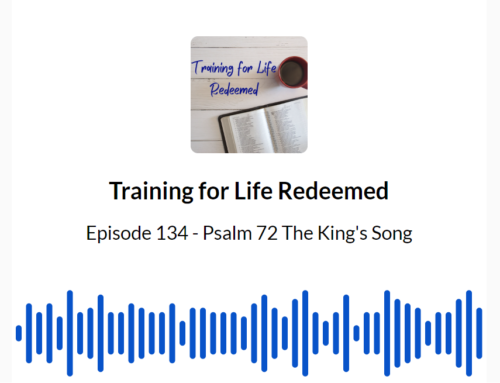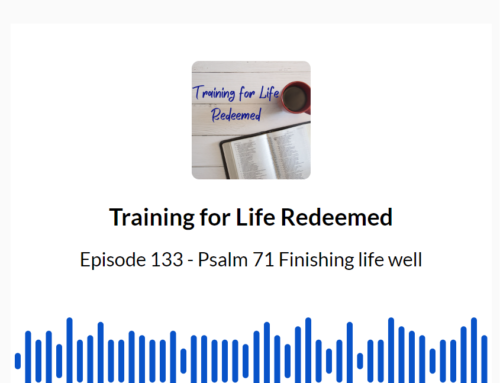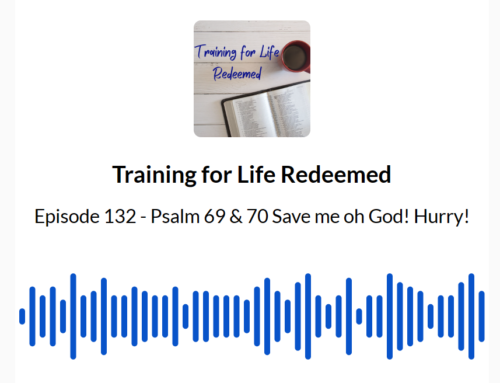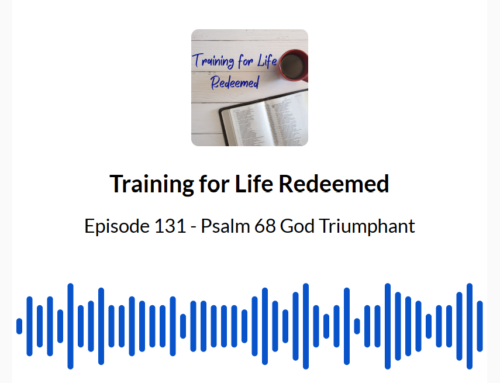Welcome to the book of Joshua. It’s all about God bringing his people home as he promised. Like Joshua we lived between the already of having been given the title to our home and the day when Jesus returns and we get to move in at last.
Grab your notes for this episode by completing the form
and we will send you the link to all our notes.
Transcript
Dan:
Hi everyone. And welcome back to training for life redeemed. I am your host, Dan, and as always, I’m joined this time virtually by my dad, Dr. David Jackson, as you can see, we’ve had to adapt the way we’re doing things with lockdown happening in Sydney. So , bear with us as we go through this, that we are beginning Joshua today, and we’re just gonna kind of do an introduction to Joshua. Now , often Joshua gets talked about as the fulfilment of the land aspect of the blessings that are given to Abraham , is that where we’re up to with the story we’ve got offspring and now we’re going into the land. Is that essentially what’s happening?
David:
Yeah, it’s , it’s essentially what’s happening. We’ve gone from , being a homeless nobody to being a slave down in Egypt in some other foreign land and getting abused by the locals. And now we’re free. We’ve gone through the wilderness for 40 years , this generation that w ere ungrateful and disobedient. they’ve all died off it’s now their kids, Moses has stood t hem up at the top of Mount Nebo and got them sorted out to commit to the covenant all over again and handed the baton over to Joshua. And he goes up Mount Nebo somewhere and dies. And Joshua w as standing there with all the Israelites going Now, we’ve got a cross the river and take on these Canaanite fellows and actually occupy this land God promised to give us.
Dan:
Yeah. And it’s not just the land that God promised them. Either. God promised that he would live with Abraham in that land. Like it was, was where God was. and so is that still the case? I mean, they’re walking around the desert for the last 40 years with God in a tent, in a tent tabernacle that is t his still the home? Is t his still where God is? Or is home wherever they are just, God’s walking a round t here i n t hat he’s in a tent with them camping
David:
With them . Yeah, it’s , it’s pretty interesting. Isn’t it? If you think of the old Testament in 500 year blocks , y ou, you come across Abraham around 2000 BC and in those days, if God wanted, you know, the relationship with God was that he’d drop in and have a chat with you and leave. and then you get to Mount Sinai and God says, right. If you’re going to be my people, you’re going to enter into a covenant. You know, we’re going to create this as my family. So y ou time you get to Exodus 25, go build me a place to live with you. So they all go madly around for the rest of Exodus, building what we call the tabernacle or God’s residence. And now God is camping out i n the Bush with his people, as it were, u m, lots of quarantine fences to make sure you don’t get dead visiting him because he’s holy and you’re a bit of a mess. And so you learn how to do all that. You learn your relationship with God on the move. and when we cross into the promised land for the next 500 years, we’re still going to be having this tent business going on, but then Solomon’s going to build a permanent residence . w ell, the rest of the story is that 500 years later that gets knocked down and y ou go on t o live in Babylon for a while. And eventually we built t he real temple, which is the holy spirit coming to dwell with these people. U m, and that’s where we are today. But our ultimate goal is to be t he new creation, living with God without sin, death, and all this o t her rubbish.
Dan:
Yeah . And Joshua has got a lot of the same tensions that we have today. A lot of relation there between, you know , being already living with God , here he , the holy spirit, but yet we’re also looking forward to that , complete fulfilment that comes later. there’s similarities here with Joshua too, as he is coming into the land. And God’s promised it to them, it’s a gift from God, but yet they’ve got to go through and conquer and defeat the Canaanites Hittites Jebusites and the Amorites. If I can remember all these names that he’s going to go through and, and defeat these people t hat essentially wipe them out is what G od’s told him to do. I mean, they don’t quite do that because they’re sinful, but, they, they head in to do that. And then it doesn’t co me to fulfil it. An d they have this kind of issues where they’re constantly having to fix themselves up, I guess, ca use t he Canaanites le ad t hem astray. Then they come back to God and all that kind of stuff. And obviously leading into Judges, this is going to be a recurring thing. Even just hearing Joshua, there’s a bit of that tension of a n ow not yet type thing happening isn’t there.
David:
Absolutely. You’ve got, you’ve got God standing there saying, I will fight for you. Oh , this is a gift I’m giving you the land. Trust me, come down to the water side , stick your foot in the water, the water parts. you know, we’re going t o go across, I’ll take care of the bad guys. You just clean up the mess afterwards. And he does. I t’s incredible. an d h e, an d h e has fun with it. you know, if you’re going to cross the Jordan river and God’s going t o d o a miracle to show you that he’s the one that’s going to take care of you, he picks flood time to cross the river and parts t he water for you when you go across on dry land and pick up all the rocks in the middle of it , put a little pile on the side an d s ay, yeah, your uncle Fred got that rock out of the middle of that river. you know , just remember when God says he does stuff, he does stuff. And then up, we go and we have to fight all these bad guys, but the bad guys never go away. So the, the battle is going to be for Joshua’s people as for you and me. do I give into the culture, the dominant culture around me, or do I stay faithful to Yahweh and build a different culture? Do I build culture of, you know , faithfulness to God’s character, love justice, peace forgiveness, grace, or do I go over to this other terrible looking culture that we’ve got, which are the Canaanites?
Dan:
Yeah, it’s definitely a , a strong tension. That’s there throughout Joshua. I mean, it’s kind of portrayed quite often as this, you know , he walks in and it’s all very victorious. They divide up the land and that’s all easy , uh, in that, in that kind of a process with Joshua. But , uh, that doesn’t actually, that’s not really the case. That’s not an accurate portrayal of what’s happening throughout this story. I mean , uh, even just seeing the constant movements and the other defeating little cities, but they’re not occupying the whole land. They’ve got actually, you know , set up farms , which tribes are going where and all that kind of stuff. It’s, it’s prolonged the process really
David:
Here. I mean, you get to the first half of Joshua and you’ve, you’ve, you’ve conquered all these cities and the armies of your enemy have runaway. But then by the time you come back and you want to go and occupy the city, the enemies come back again. So, you know , Joshua drives the bad guys out of Hebron. and t hat five years later they’ve taken care of the bad guys in the north. They come back to Hebron and the bad guys are back again saying, you come on, we’ll have you. Try again. Some of these bad guys are pretty big. These are the sons of Anak they’re three minutes tall. You want to come on. So, you know , I love that part of Joshua, Caleb, Caleb says to the spies , come on guys. We can take these big guys on a , yeah. They’re three, four meters tall. That’s nothing. God does the fighting. Let’s go enjoy the scene. And they all go, no, no , no, no, no. We can’t do that. You can’t do that. 40 years later, Caleb is 80, 85 years old. He says to Joshua, I want to go down to Hebron and finish that up . Can I have Hebron , please settlement you guys down there. And it does it 85 years old. I should be so fit. I’d have trouble getting up the Ridge. But look at these guys. The passion for following the Lord is brilliant. Um , and I , and the period of Joshua is wonderful. It’s the only two generations Joshua’s generation. And the one that followed are the only two generations in history of God’s people in the land who actually were faithful. They get no criticism at all. Mind you, their grandchildren throw the whole thing in the bin.
Dan:
They didn’t teach their kids very well.
David:
Yeah, there’s a list. Teach your kids. Well , these, their parents didn’t teach them. They did teach their kids and their kids didn’t teach the grandchildren. But you look at two generations that are faithful. That’s awesome.
Dan:
The questions that quite often comes up when I was teaching this in classrooms is kids are wondering how can that possibly be okay for the Israelites to go in and wipe out all these people. I often used to respond by highlighting the fact that we’re all sinful and we all are deserving of death. And actually, you know, for anyone to die, it’s actually justice. and for anyone to be saved is grace. And therefore the Canaanites, the Hittites, the Jebusites as if they’re kind of an example of what we all deserve , coming to them through God. And you’re choosing people to do that. And then God is actually being gracious to his people by bringing them in, but also gracious t o particulars throughout the story. Like we have our Rahabs and other people who, and people who t rick their way i n, but they get in right t here. They’ve done it to try and save their lives. And they’re happy to s witch over if that means. Yeah,
David:
It’s really hard. I think often we teach Joshua to children like a boys’ own adventure, you know, pick up your sword and shield and let’s go beat the bad guys. And you know, you’ve got four year olds banging away with storage and sticks in the backyard and you get the idea that that’s what Joshua was about. Or alternatively, you think of something like , Rwanda and you think of genocide and you go, this can’t be good, right? This is not, this is not the God I know. U m, so the first couple of things we need to note is God did not send Israel in to commit genocide. There were two types of battles that were fought. One was that you wipe out every living person in the city. So you go into a city like Jericho, you leave nothing standing. You leave, nobody alive. You just take the whole place out. So Jericho becomes a sandbox model of what happens when Jesus comes back. If you’re not in Christ, you’re toast, you’re an enemy of God. And you’re going to go down. And every single person who is a descendant of Adam is born in, conceived in sin. And iniquity There’s none innocent in this city. Everybody’s going down because they are enemies of God. Now he doesn’t do that to every city. He does that to a couple of cities. He makes an example of them. And then you watch , you see the Canaanites, then get the idea and they run for their lives. But after that , um, you’re looking at a process of turning an ungodly land into a godly culture. So I think one of the things we need to keep in mind is when God gave Abraham the land, he waited nearly 500 years before the land, before Joshua could move in . During that 500 years, he said to Abraham, because the wickedness of the Amorites is not complete. So I’ve got basically got to wait till these guys are bad enough that when you go in, you will understand why they’re getting judged. So you look at, I mean , this is a bit of a warning for Western society. So Hey, you know, we’ve got floods, fires, volcanoes, Tsunamis pandemics, everything else, just a little wake up call guys , um, judgment day , uh , here’s a culture that committed that sacrificed babies to their gods on a barbecue fire. Okay . They burned their babies alive in worship of their gods because they wanted more money. They wanted fertility in the land. They wanted to get rich. And the way to do that is kill your children. There’s a few echoes in our culture here. You’ve got a bunch of people who are worshipping sex gods by committing teenagers to be ritual, sacred prostitutes. I mean, you can imagine in this culture, if you send your children to their equivalent of church, you’re signing your 14 years olds up to be prostitutes, boys and girls. And they’re going to think that’s an act of worship. This is a foul and disgusting culture. You know , ritualized, paedophilia, you know, mass murder of babies. And that’s just how they treat the kids wait till you get to the adults. So God is saying, that’s , you know , it’s reached the point where it’s not tolerable, like the flood we’re going to have to prune this tree. This has got to go. I, I , I think there’s a , there’s a big lesson for us that I don’t think we want to learn. I would hate to have been an Israeli soldier sent into Jericho and told the slaughter, everybody that everything that moves, there’s no way anybody could do that without coming out PTSD. But there’s something going on in your head that says, hang on, this, isn’t my idea. I’m not doing this because I hate those people. Or because you know, I’m a racist or something. This is God told me to go in and do this because he’s angry with those people. They’ve offended him, not me. Um, and I’m looking at what would happen to me if I was an enemy of God and that’s, that’s not boys own adventure stuff. That really is me sitting at the foot of the cross going, you did that in my place. So one of the things I say to the kids at school was, yeah, okay. You don’t like the fact that God’s going to go down in there and kill all these people. We call it a kherem warfare, but here’s a little clue for you. The God who ordered that is the God who took that for me, he did kherem to himself so that he didn’t have to do it to me. And that’s where Jericho really hits me hard because, and it’s meant to do that. And so you see , Isn’t it lovely. If God’s going to save somebody who does he say , does he save the nicest wisest, gentlest old man in the whole of Jericho? Or did he go and find the local prostitute? So we’re going to do a, Canaanite a woman, who’s a prostitute and possibly a ritual prostitute to their gods, right? We’re going to save her and her whole family and make an example of her. And what that says to me is no matter what you are, no matter where you’ve gone, what you’ve done and what we deserve when Jesus took kherem in my place, I hide in him. Like she hid in the house with her family. We are that little phrase under the blood. The book of Joshua is great for that sort of stuff.
Dan:
I think we might stop our introduction there. And Hopefully we want to encourage you guys to all come back and join us as we continue to actually go through, Joshua bit by bit. This is episode 37. So if you want to come and watch the video this time, you know, via zoom and stuff online, or you want to get the transcript or anything like that, get the study. The daily notes Dad for this, yup. Come and grab those. Are they are at trainingforliferedeemed. c om/37. We would love for you to join us there. If you enjoyed the episode, please make sure that you subscribe, leave us a review as well. If you l oved i t and make sure that you come back next week, we’ll see you then.



